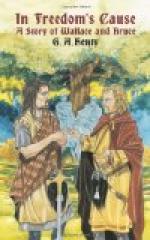When night came on Archie started for the west, accompanied by Ronald and two of the Irish as guides. They crossed the country without question or interference, and reached the wild mountains of Donegal in safety. Archie had asked that his conductors should lead him to the abode of the principal chieftain of the district. The miserable appearance of the sparsely scattered villages through which they had passed had prepared him to find that the superiors of such a people would be in a very different position from the feudal lords of the Highlands of Scotland. He was not surprised, therefore, when his attendants pointed out a small hold, such as would appertain to a small landowner on the Scottish Border, as the residence of the chief. Around it were scattered a number of low huts composed of turf, roofed with reeds. From these, when the approach of strangers was reported, a number of wild looking figures poured out, armed with weapons of the most primitive description. A shout from Archie’s guides assured these people that the newcomer was not, as his appearance betokened him, a Norman knight, but a visitor from Scotland who sought a friendly interview with the chief.
Insignificant as was the hold, it was evident that something like feudal discipline was kept up. Two men, armed with pikes, were stationed on the wall, while two others leant in careless fashion against the posts of the open gate. On the approach of Archie an elderly man, with a long white beard, came out to meet them. Ronald explained to him that Archie was a knight who had come as an emissary from the King of Scotland to the Irish chieftains, and desired to speak with the great Fergus of Killeen. The old man bowed deeply to Archie, and then escorted him into the house.
The room which they entered occupied the whole of the ground floor of the hold, and was some thirty feet wide by forty long. As apparently trees of sufficient length to form the beams of so wide an apartment could not be obtained, the floor above was supported by two rows of roughly squared posts extending down from end to end. The walls were perfectly bare. The beams and planks of the ceiling were stained black by the smoke of a fire which burned in one corner; the floor was of clay beaten hard. A strip some ten feet wide, at the further end, was raised eighteen inches above the general level, forming a sort of dais. Here, in a carved settle of black wood, sat the chief. Some females, evidently the ladies of his family, were seated on piles of sheepskins, and were plying their distaffs; while an aged man was seated on the end of the dais with a harp of quaint form on his knee; his fingers touched a last chord as Archie entered, and he had evidently been playing while the ladies worked. Near him on the dais was a fire composed of wood embers, which were replenished from time to time with fresh glowing pieces of charcoal taken from the fire at the other end of the room, so that the occupants of the dais should not be annoyed by the smoke arising close to them.




